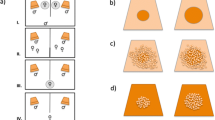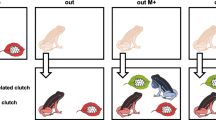Summary
The threespine stickleback,Gasterosteus aculeatus is a voracious cannibal of both its own eggs and those of conspecific neighbours. Females, but not males, can distinguish their progeny from those of other fish and attacked alien eggs more frequently. In experiments to examine nest raiding, females that initiated raids on nests resulting in cannibalism were the first females to spawn in the reconstructed nest. These results support the hypothesis that cannibalism by females may be adaptive in situations where intense female competition for male guardians occurs.
Similar content being viewed by others
References
Assem J van den (1967) Territory in the three-spined stickleback,Gasterosteus aculeatus L., an experimental study in intra-specific competition. Behaviour [Suppl] 16:1–164
Dominey WJ, Blumer L (1984) Cannibalism of early life stages of fishes. In: Hausfater G, Blaffer Hrdy S (eds) Infanticide: comparative and evolutionary perspectives. Aldine, Chicago, pp 43–64
Feuth-de Bruijn E, Sevenster P (1983) Parental reactions to young in sticklebacks (Gasterosteus aculeatus L.). Behaviour 83:186–203
FitzGerald GJ, Whoriskey FG (1985) The effects of interspecific interactions upon male reproductive success in two sympatric sticklebacksGasterosteus aculeatus andG. wheatlandi. Behaviour 93:112–125
Hausfater G, Blaffer Hrdy S (eds) (1984) Infanticide: comparative and evolutionary perspectives. Aldine, Chicago
Kynard B (1978) Breeding behaviour of a lacustrine population of threespine sticklebacks (Gasterosteus aculeatus L.). Behaviour 67:178–207
Li SK, Owings DH (1978) Sexual selection in the three-spined sticklebacks: II. Nest raiding during the courtship phase. Behaviour 64:298–304
Loiselle P (1983) Filial cannibalism and egg recognition by males of the primatively custodial teleostCyprinodon macularius californiensis Girard (Atherinomorpha: Cyprinodontidae) Ethol Sociobiol 4:1–9
Polis G (1981) The evolution and dynamics of intraspecific predation. Annu Rev Ecol Syst 12:225–251
Reed A, Moisan G (1971) TheSpartina tidal marshes of the St. Lawrence estuary and their importance to aquatic birds. Nat Can (Quebec) 98:902–922
Rohwer S (1978) Parental cannibalism of offspring and egg raiding as a courtship strategy. Am Nat 112:429–440
Salfert IG, Moodie GE (1985) Filial egg-cannibalism in the brook sticklebackCulaea inconstans (Kirkland). Behaviour 93:82–100
Whoriskey FG, FitzGerald GJ (1985) Sex, cannibalism and sticklebacks. Behav Ecol Sociobiol 18:15–18
Wootton RJ (1971) A note on nest raiding behaviour of male sticklebacks. Can J Zool 49:960–962
Author information
Authors and Affiliations
Rights and permissions
About this article
Cite this article
FitzGerald, G.J., van Havre, N. The adaptive significance of cannibalism in sticklebacks (Gasterosteidae: Pisces). Behav Ecol Sociobiol 20, 125–128 (1987). https://doi.org/10.1007/BF00572634
Received:
Accepted:
Issue Date:
DOI: https://doi.org/10.1007/BF00572634




